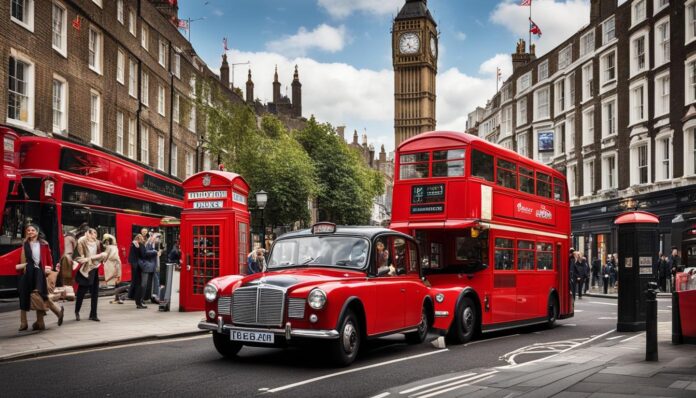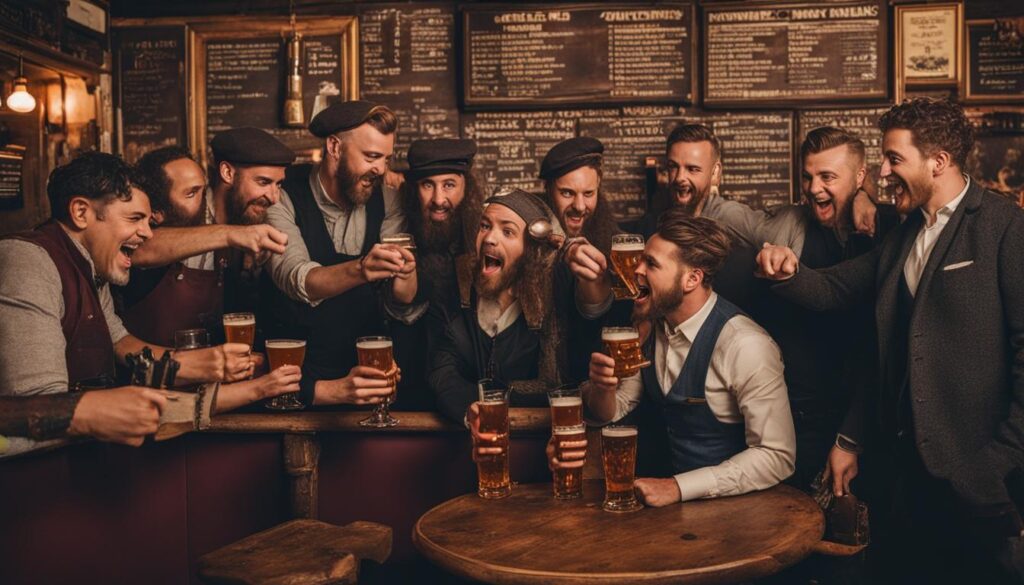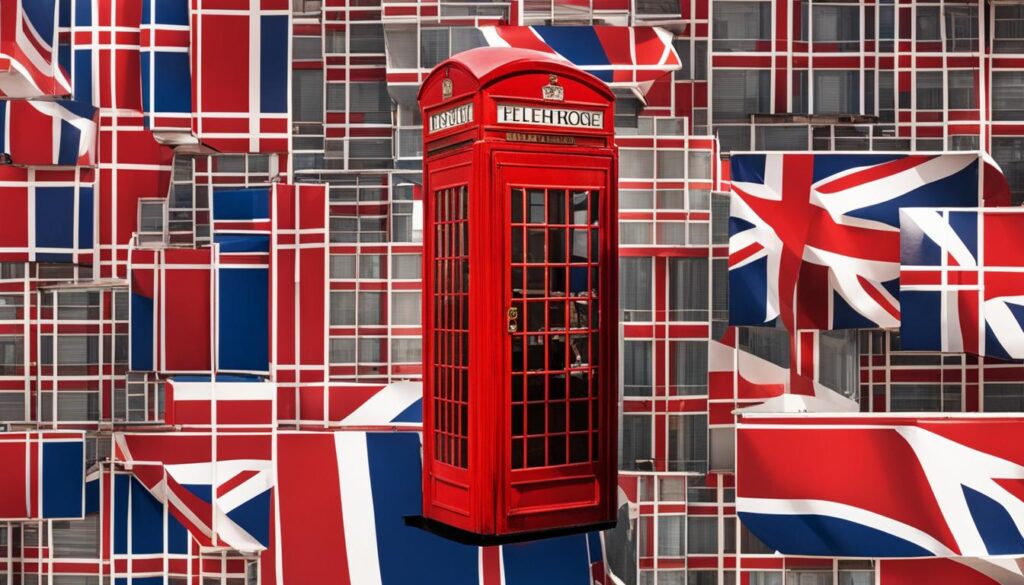Are you planning a trip to the UK or just curious about British slang? Learning the most common British phrases is essential to understanding the language and culture of Britain. In this guide, we’ll explore some of the most popular British phrases you should know. By the end of this article, you’ll have a better understanding of British expressions and slang.
From the classic “cheerio” to the widely used “mate,” British slang is an interesting blend of traditional idioms and modern expressions. Our guide will cover a range of topics from Cockney rhyming slang to insults and banter. Whether you’re a language enthusiast or just want to improve your cross-cultural communication, this guide is perfect for mastering British slang.
So, what are some of the most common British phrases you should know? Let’s dive in and start expanding your linguistic knowledge.
Understanding British Slang: A Brief Introduction
Before you dive into learning popular British phrases, it’s helpful to understand what British slang is and how it differs from standard English. British slang consists of words and phrases that are commonly used in informal conversations across the United Kingdom. These phrases are not typically found in formal writing or speech.
While some British slang may be unfamiliar to non-native speakers, learning essential British phrases can help you better understand and communicate with Brits. Here are some examples of popular British phrases that you should know:
- “Cheers”: This phrase is commonly used to mean thank you or goodbye.
- “Bloke”: A term used to refer to a man.
- “Chuffed”: This means pleased or delighted.
- “Gutted”: To feel devastated or upset.
- “Ace”: This phrase is used to describe something that is excellent or great.
Learning these useful British phrases can help you blend in with the locals and improve your cross-cultural communication.
It’s important to note that British slang can vary across different regions and even social groups. For example, the slang used in London may be different from that used in Manchester. Additionally, certain groups, such as teenagers or musicians, may have their own unique slang phrases.
Examples of Essential British Phrases
Here are some additional popular British phrases that you may find useful:
| Phrase | Meaning |
|---|---|
| “Brilliant” | Same as “ace”; means something is fantastic or excellent. |
| “Blimey” | An expression of surprise or shock. |
| “Knackered” | To feel very tired or exhausted. |
| “Sod off” | An impolite way of telling someone to go away. |
| “Ta” | A casual way of saying thank you. |
Incorporating these phrases into your vocabulary can help you better understand and connect with Brits.
Cockney Rhyming Slang: A Classic British Tradition
If you’ve ever heard a British person using Cockney rhyming slang, you might think they’re speaking a different language altogether. This unique form of British slang originated in the East End of London in the 19th century and is still prevalent today.
Cockney rhyming slang involves replacing a common word with a phrase of two or more words, where the last word rhymes with the original word. For example, instead of saying “stairs,” a Cockney might say “apples and pears.” It can be confusing to outsiders, but once you understand the phrases, it can be a lot of fun to use.
| Common Word | Cockney Rhyming Slang | Meaning |
|---|---|---|
| Phone | Dog and bone | “I’m off to give her a dog and bone” |
| Money | Bread and honey | “Can I borrow some bread and honey?” |
| Feet | Plates of meat | “My plates of meat are killing me!” |
As you can see from the examples above, Cockney rhyming slang can take some getting used to. But once you’ve mastered it, you’ll be able to impress your British friends with your knowledge of this classic tradition.
British idioms and slang are an important part of the country’s culture. Understanding and using them can help you communicate more effectively with locals and gain a deeper appreciation for British customs.
British Expressions for Everyday Situations
Whether you’re visiting the UK or just want to understand British culture a bit better, learning some common phrases is a great way to improve your communication skills. Here are some British expressions you’ll hear in everyday situations:
Greetings
When meeting someone for the first time, a simple “hello” or “hi” will do. In more formal situations, it’s common to say “pleased to meet you.” If you want to sound like a true Brit, try using the informal greeting “cheers.”
Expressions of Surprise
When you hear something surprising, you might say “blimey!” or “cor!” to show your shock. If you’re really surprised, you can exclaim “bloody hell!”
Agreement and Acknowledgement
If someone asks if you understand them, you can say “gotcha” or “got it.” To show agreement, you can say “yeah” or “alright.”
Disbelief and Skepticism
If you’re skeptical or don’t believe what someone is saying, you might say “pull the other one!” or “you’re having me on!”
Disappointment and Frustration
If you’re disappointed or frustrated, you can say “gutted” or “bummer.” If you’re really angry, you might use stronger language like “bloody hell” or “sod it.”
Expressions of Gratitude
To thank someone, you can say “ta” or “cheers.” In more formal situations, you can say “thank you very much.”
Remember that tone and context can greatly affect the meaning of these expressions. When in doubt, observe how the locals use them and follow their lead.
British Insults: A Playful Banter
British humor is often characterized by playful banter and quick-witted insults. This section will introduce you to some commonly used British insults that will help you understand and participate in witty exchanges.
When interacting with Brits, it’s important to remember that insults are often used in a playful manner and are not intended to offend. If you’re unsure whether an insult is appropriate, err on the side of caution and refrain from using it.
Here are some common British insults:
| Insult | Meaning |
|---|---|
| Plonker | An idiot or fool |
| Berk | Rhyming slang for “Berkshire Hunt,” meaning a stupid person |
| Muppet | A foolish or incompetent person |
| Wally | A silly or foolish person |
| Pillock | An idiot or fool |
It’s worth noting that some British insults have a regional or cultural context, so it’s important to be aware of the context in which they are used. Additionally, some insults may sound harsh to non-native speakers, so it’s always a good idea to approach them with caution.
Overall, British insults are a fun and playful way to engage in banter with locals. By learning some of the most commonly used insults, you’ll be better equipped to understand and participate in these conversations, adding an extra layer of cultural understanding to your interaction.
British Food and Drink Phrases
British cuisine has its own unique language, with phrases related to food and drink. If you’re planning a trip to the UK, or just looking to expand your cultural knowledge, here are some British phrases to know:
Afternoon Tea
A classic British tradition, afternoon tea is more than just a beverage. It’s an experience! Here are some phrases to help you navigate this delightful pastime:
| Phrase | Meaning |
|---|---|
| Jam and cream | Refers to the order in which to put these two toppings on a scone when having afternoon tea. |
| Fancy a cuppa? | Translation: Would you like a cup of tea? A common way to offer someone a drink. |
| Posh nosh | Refers to high-quality, fancy food. Often used to describe what you would have at a fancy afternoon tea. |
Pub Culture
Pubs are a cornerstone of British culture, and they have their own unique phrases to describe the food and drink:
| Phrase | Meaning |
|---|---|
| A pint of the usual, please | A common phrase used to order a pint of the regular beer that you usually have at a particular pub. |
| Cider | In the UK, the word “cider” refers to an alcoholic drink made from apples. This is different from what it means in the US, where it refers to an unfiltered, fermented apple juice. |
| Toad in the hole | A classic British dish consisting of sausages cooked in a batter that rises like a hole in the middle of the dish. |
Learning these British expressions will add depth to your cultural knowledge and enhance your experience while traveling or communicating with Brits.
British Sports and Leisure Phrases
If you’re a sports fan or just looking to enjoy some leisure activities in the UK, it’s helpful to know some commonly used phrases. Here are some popular British phrases that will come in handy:
Football
Football (or soccer) is a beloved sport in the UK, and if you’re planning on attending a match, here are some phrases you might hear:
- Kit: Refers to a player’s uniform
- Pitch: The playing field
- Nil-nil: Refers to a tied score of 0-0
- Extra time: Additional time added to the end of a match if the score is tied
Cricket
Cricket is another popular sport in the UK, and if you’re attending a match, here are some phrases you might hear:
- Stumps: The three posts that the bowler attempts to hit with the ball
- Wicket: The area behind the stumps where the batter stands
- Sixer: When the batter hits the ball over the boundary without it bouncing
- Bowler: The player who bowls the ball to the batter
Hobbies and Recreation
When discussing hobbies and recreational activities, here are some useful British phrases:
- DIY: Stands for “Do It Yourself,” referring to projects you do at home
- Cinema: A movie theater
- Gigs: Live music performances
- Pub crawl: Visiting multiple pubs in one night
“There is nothing quite like the atmosphere at a football or cricket match in the UK. Knowing some of these popular phrases will help you blend in with the locals and enjoy the sporting experience even more.”
British Travel and Transportation Phrases
If you’re planning a trip to the UK, it’s essential to know some British phrases for travel and transportation. Here are some of the most useful phrases that you should learn before your trip:
Getting Around
“Excuse me, where is the nearest tube station?”
The tube is the London subway system, and it’s one of the quickest ways to get around the city. If you need to ask for directions, this is a common phrase to use.
“Do you know where I can catch a bus to the city center?”
If you prefer the bus to the tube, this phrase will come in handy. The city center is a common destination, but you can also replace it with other locations.
Booking Accommodations
“I’d like to reserve a room for two, please.”
When booking a hotel or other accommodations, this is a common phrase to use. Make sure to specify the number of guests and any other preferences you may have.
“Is breakfast included in the price?”
This phrase will come in handy if you want to know whether your morning meal is included in the price of your accommodations.
Asking for Directions
“How do I get to the train station?”
If you need to catch a train, it’s important to know the way to the station. This phrase is a great way to get directions from a local.
“Can you tell me how to get to this address?”
If you have a specific address to find, this phrase will help you get there. Make sure to have the address written down or on your device to show the person you’re asking for directions.
Talking to Taxi Drivers
“How much will it cost to get to this location?”
When taking a taxi, this phrase will help you know how much the fare will be before you get in. It’s always good to double-check the price.
“Can you take me to the airport/train station, please?”
If you need a ride to a transportation hub, this phrase will come in handy. Make sure to specify which airport or train station you need to go to.
Learning these essential British phrases is the first step to a successful trip to the UK. With these phrases in your toolkit, you’ll be able to navigate travel and transportation like a local.
British Weather Expressions: Talking About the Rain
It’s no secret that the British love to talk about the weather, and that includes the rain. Rain is a common occurrence in the UK, and it often serves as a source of conversation for many Brits. In this section, we’ll explore some popular British expressions related to rainy weather.
Famous British Weather Expressions
As with many aspects of British life, there are plenty of sayings and expressions related to rainy weather. Here are some of the most popular ones:
| Expression | Meaning |
|---|---|
| “It’s raining cats and dogs” | This expression is used to describe heavy rain. |
| “It’s tipping it down” | This means that it’s raining heavily. |
| “It’s chucking it down” | This means that it’s raining heavily. |
| “It’s coming down in buckets” | This means that it’s raining heavily. |
| “It’s a bit damp” | This is a more understated way of saying that it’s raining. |
Using Weather Expressions in Conversation
If you want to blend in with the locals and join in on conversations about the weather, it’s helpful to know some of these expressions. For example, if someone says “it’s chucking it down outside”, you can respond by saying “yes, it certainly is!”
Additionally, using these expressions can demonstrate a level of cultural knowledge and help you connect with Brits on a deeper level.
Now that you’re familiar with some of the most popular British weather expressions, you’ll be better equipped to join in on conversations about the rain. So the next time it’s pouring outside, try out some of these phrases and impress your British companions!
British Colloquialisms: Regional Variations in Slang
While many British expressions are widely used across the country, there are some colloquialisms that are specific to certain regions. Understanding these regional variations can give you a deeper insight into the diverse cultures and dialects across the UK. Here are some common British slang phrases and their regional variations:
North of England
The North of England has a rich history of slang, with many unique expressions that are still commonly used today. Here are a few:
| Expression | Meaning |
|---|---|
| Ginnel | An alleyway or narrow passage |
| Chuddy | Chewing gum |
| Cobblers | Nonsense |
Scotland
Scotland has a distinct dialect and slang words that are unique to the region. Here are some commonly used expressions:
- Blether – To talk excessively
- Bairn – A child
- Chancer – Someone who takes risks or pushes their luck
The Midlands
The Midlands is known for its friendly, down-to-earth people, and this is reflected in their slang. Here are a few examples:
“Alright me duck?” – A friendly greeting, often used to address strangers
- Gobsmacked – Surprised
- Bob’s your uncle – A phrase meaning “there you have it”
Wales
Wales has its own unique language, but they also use a lot of English slang. Here are some Welsh expressions:
| Expression | Meaning |
|---|---|
| Cwtch | A hug or cuddle |
| Lush | Something that is really nice or attractive |
Learning these regional variations in British slang can help you navigate conversations with locals and gain a better understanding of the UK’s diverse cultures and dialects.
Conclusion: Mastering Common British Phrases
Congratulations, you’ve made it to the end of our guide to mastering some of the most common British phrases. By familiarizing yourself with these expressions, you’ll be better equipped to understand and communicate with Brits.
British slang and expressions can be confusing, but with practice, you’ll start to recognize and use them like a true native. Keep in mind that British slang is a constantly evolving language, so don’t be surprised if you encounter new phrases or variations.
Start Practicing Today
Whether you’re planning a trip to the UK or just want to expand your linguistic knowledge, mastering British slang is a valuable skill. Start practicing these phrases today and enjoy your newfound ability to speak like a true Brit.
Remember to pay attention to context and use these phrases appropriately. With patience and practice, you’ll soon be able to converse confidently with Brits and get a deeper understanding of their culture.
Stay Curious
Learning a new language can be a lifelong endeavor, but it’s one that’s always worth pursuing. Keep an open mind and stay curious about different cultures and languages.
Who knows, you might even discover new phrases and expressions that are unique to your own country or region. In the meantime, keep practicing those British slang phrases and enjoy the fun and playful language of the UK.
Keywords: Most common British phrases, British phrases to know, British slang, British expressions
















































